Decentralizing Detroit : From Grid to Off-Grid
“...If design is merely an inducement to consume, then we must reject design; if architecture is merely the codifying of bourgeois model of ownership and society, then we must reject architecture; if architecture and town planning is merely the formalization of present unjust social divisions, then we must reject town planning and its cities...until all design activities are aimed towards meeting primary needs. Until then, design must disappear. We can live without architecture...” - Adolfo Natalini (Architect of Superstudio) in 1971.
The Fall of Detroit's Automotive Empire
A metropolis of industry, music and culture; Detroit once held close to 2 million residents in 1950. Today, the city's population sits closer to 700,000. This sharp decline was a result of Detroit's dependency on a single-source-economy; the automotive industry. The "Motor City" was a mecca for all-things-auto back in the middle 20th century. However, after a series of advances in automotive assembly and machine-based manufacturing, car manufacturers no longer needed multi-story plants in urban areas. Fewer employees were needed to operate simplified machinery, and it became far cheaper to build single-story warehouses outside of major city centers. With this unprecedented shift... Detroit's economy was gutted.
The imagery of Detroit from above is provocative... Here's a look at how the city became de-populated over time...
Detroit proper is a city of 138.76 square miles (that's massive).
It has the bones of a city planned to hold millions of people. Today, the city's infrastructure is being stretched thin. Electrical lines, water and waste pipes travel through ghost neighborhoods with only a few scattered residents. Pockets of communities stretch across a massive, and largely vacant street grid.
Opportunity to Break the Grid
With collapse comes opportunity. Abandoned portions of street grids have become grown-over and new funky-shaped neighborhoods are beginning to take root. There's a new kind of improvisation happening in Detroit. Public art, off-grid infrastructure and urban farming have become new signatures. There's a growing decentralized mindset here, in a city that was once the epitome of "central."
Central vs. Decentral
What is happening in Detroit represents a broader cultural shift. In the last few decades, greater access to global-resources and technology has fostered an “off-grid” mindset in architecture, cities and in neighborhoods. A rising culture of energy independence and DIY (do it yourself) living has ushered in a new craving for decentralization.
Much of this "new" Detroit has whole-heartedly rejected the consumerist utopia it once was. While there is a sense of historical pride, there's also a deep-rooted bitterness focused on the big auto industries and politicians who left the city dry. In wake of a tragic economic collapse, generations of auto-makers have traded socket wrenches in for gardening trowels. Residents are embracing opportunity in something far more organic and holistic. Perhaps Detroit doesn't need to rebuild itself in the way you might expect.
Why try to re-make a single-city-center when you can have dozens of neighborhood-centers? This "New" Detroit could very well become the first true 21st century American "City"...
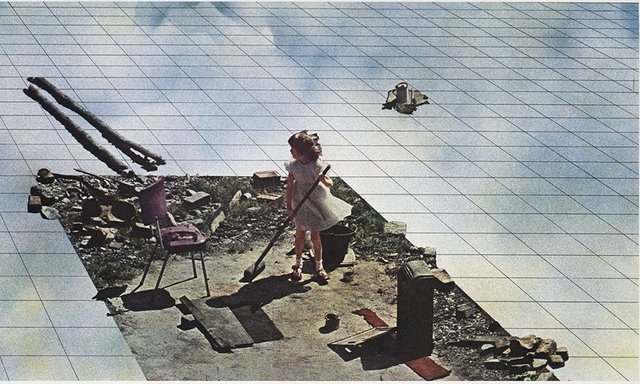

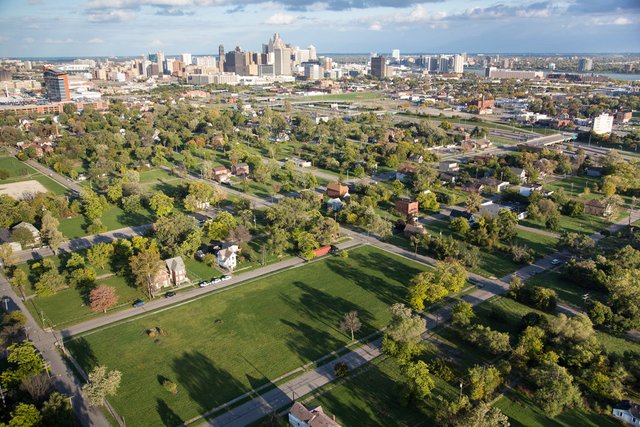
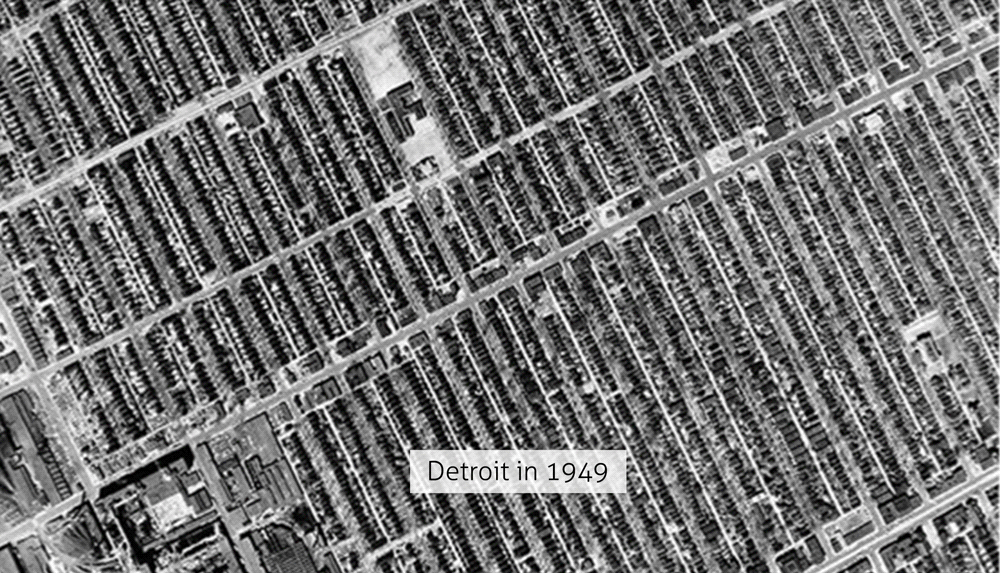


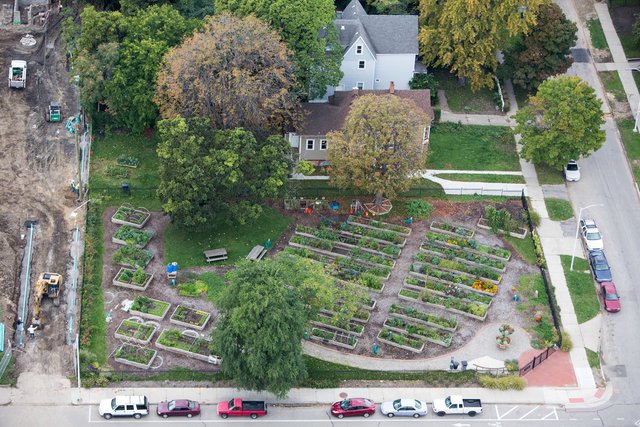
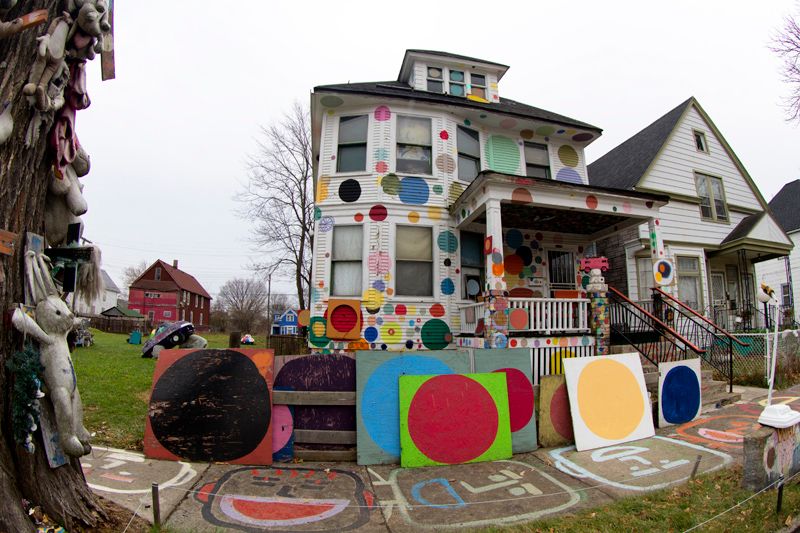


Excellent post @voronoi. As a Detroiter I wanted to add some color to the conversation. There is also a considerable amount of new "redevelopment" happening in the downtown, midtown, Corktown, Brush Park, arena district, and other wealthy neighborhoods of Detroit. A lot of these developments have brought new blood into the city, many of whom do not understand the context of "old" Detroit. And no, I am not talking about Detroit in the '40s, but rather Detroit post white-flight.
Anyways, for a city that is such a massive sprawl, a lot of the new development popping up is in favor of the wealthy few at the expense of many. For example, the new "Little Caesar's" arena (why the hell can't we name these places after people anymore?) is being subsidized by the taxpayers, many of whom live on the fringes of Detroit and don't have access to transportation, money, and opportunities needed to leverage the new developments. Despite that, the city has also allowed the community benefits agreement associated with the project to be less in favor of the people and more in favor of the big money that is funding the rest of the project. It's status-quo bureaucracy and gentrification in full-swing.
There are certainly a lot of great, decentralized developments happening outside of the aforementioned hotspots here, but it is not enough to change the lives of everyone yet. Hopefully we can accelerate the movement you're describing and reclaim more of the city back for the people at large and not just the wealthy. The rest of the city needs a voice in these matters.
In closing, this is one awesome project that is attempting to give more Detroiters a voice in how their city is shaped: http://www.cooperativecap.com
I also REALLY want to start a digital currency movement here. I'm restless to an have been thinking on it for years. The time is ripe now. Just need to carve out time to plan!
@robrigo, brilliant thoughts and comments. I was hoping I might tease out a Detroiter through this post!
I agree 100%. It seems like so many of the big infrastructural projects happening now are not catering to the fringe neighborhoods and folks who need (for example) transportation the most... Like the Woodford Avenue M-1 Rail line that is clearly biased towards certain regions of the city and wealthier suburbs. I remember hearing that this project was being funded (in part) by Quicken Loans? That whole relationship makes me feel uneasy. I'd be curious to hear from a local - what's the general feeling towards M-1?
One other question related to infrastructure - what are your thoughts on DCDC's Bloody Run Creek Greenway project?
Cooperativecap is awesome. There need to be more projects like it!
Thanks for your post @voronoi! As someone who has recently moved to Detroit, I'm keen on learning more about Detroit's past and the potential futures people are envisioning. It is definitely an exciting time to be here and I do hope Cooperative Capital can hurry up and get started (I've signed up but haven't heard any news).
As someone who does not own a car and lives in downtown Detroit, I appreciate the QLine. Yes, they could have designed it to reach more people, but I think it's a good start. At least it is further connecting Midtown and Downtown, which I believe will help bring some life to the somewhat underutilized space between the two fairly developed areas. Maybe this is a naive point of view, but I'm glad Quicken Loans is partially funding the QLine and getting involved with the city. It didn't look like anyone else was stepping up to help.
You cant really complain about the stadium, literally there is like... 1 left in the 4 major sports that doesn't have a corporate sponsor. We were fortunate enough to have two of the last ones here in Joe Louis and the Palace.
The money for the stadium is coming from the DDA (downtown development authority) so it can only be used downtown. Yes, the neighborhoods of Detroit need massive work, the school system is a mess, lots of building to demolish, etc.. but that money can't go to that. If it has to be used downtown I am fine with a new stadium.
Excellent map work- i do love those overlays! It's amazing how arts evolve in these areas. Which subtly (like a brick) brings me on to my next question. Are you going to the Frieze Art fair?
Ah I completely missed Frieze Art fair in NYC! We're you there??
No, I was just hoping you might be and could tell me about it!
Are the pattern's of Detroit's depopulation similar to what we will see as post-industrialized countries go through demographic transition? i.e. as birthrates drop, will other parts of the country face similar problems shown here? If so, what lessons if any can Detroit teach us about how urban planning can mitigate negative impacts of population drops?
Sure, lower population is probably exactly what our planet needs in the long run, but in the short run it's bound to make things very difficult for bloated development? Does that assessment seem right? Example articles below:
I mean, these also just highlight one aspect of how absurd and self-destructive isolationist/nationalistic policies are, but that's another topic
Yes you could argue that it's a similar pattern, but Detroit was extremely reliant on a single source economy, the automotive industry. In terms of lessons learned, I think every city needs a diverse portfolio of both economy and infrastructure.
For the Detroit example, rainwater infrastructure. Huge rains have plagued Detroit in recent years because their sewer system is no longer being maintained at a comprehensive city-scale. You have patches of the sewer that function well, but even just a minor broken pipe (underneath an abandoned block) can clog the whole system. and cause unbelievable damage.
https://www.washingtonpost.com/news/capital-weather-gang/wp/2014/08/12/record-breaking-rain-floods-detroit-metro-shuts-down-interstates/?utm_term=.ae82b3171129
To combat this new normal, a city needs a diverse range of waste water networks - large and small. Abandoned plots of land (at lower elevations) can be converted to bioswales. Permeable paving for parking lots (Detroit has a HUGE amount of impermeable paved surfaces.)
As for the babies, well that might be a whole other topic... I guess overall, residents (of all cities) need to think holistically about the diverse systems that make their community healthy and successful.
With change comes opportunity.
... and with opportunity comes innovation!
It sounds like Adolfo threw the baby out with the bathwater.
Detroit has been ahead of the curve, not by design.
He's sort of an OG... YOLO DIY'er...
Communists are notoriously short sighted though, even non-authoritarian ones. I think he may have mistaken well crafted infrastructure for centrally managed failure. Bubblegum and bailing wire is great in a pinch, but it will not provide reliable, long term results. Imagine having to create a hospital, on the spot, from whatever is available, only when one is needed.
I think he's maybe a futurist more than a communist. He was expressing frustration over a design-status-quo that had (for too long) been taken as gospel. Less about solutions, more about embracing a 1960s culture of re-orienting your world view.
Guild protectionism and other entrenched interests can be dispensed with, but the past is not all bad. There is valuable information in the design of structures that have lasted thousands of years. I don't think anything built in the 1960's will be around in the 4960's. The designers of the Coliseum were straight up geniuses. It would be a shame to dismantle it because it represents the control of the masses by someone from a higher class division. Status quo is corrupt, but it has been relatively durable. I'm not dogmatic about anything. Take the best and eschew the rest, except as a learning tool. To forget is to repeat mistakes that should be already learned.
Oh I totally agree with you here. I would never want historic architecture to be wiped out for the purpose of a clean slate. I believe in the value of historic fabric of places. Preserving the layers of rights and wrongs are what make neighborhoods dynamic and special.
Honestly, Superstudio could very well have been a group of young and frustrated modernists living in Venice, Italy, in the 1960s. That's a super tough place to live if you don't want to design/preserve classical architecture.
Anyway, I don't want to see Detroit's historic fabric deleted from history... I want to see it reinvigorated with contemporary purpose.
I wasn't addressing Detroit necessarily, just the Adolfo quote.
I've begun to discover some of the knowledge, I think that I should have been taught, but wasn't. I don't think all of the knowledge that was omitted was excluded from my education on purpose.
The Trivium and Quadrivium in their liberating form are indivisible from the origin of structural design in Greek and Roman architecture. The Trivium in structure (grammar), assembly (logic), and use (rhetoric) of language, and the Quadrivium as, math (number of itself), geometry (number in space), music (number in time), and astronomy (number in space and time) as the understanding of math and how it interacts with the dynamics of the natural world are one and the same understanding that was used to build many of the structures in Greece and Rome that have lasted so long. As a result of this not being taught, we end up with disasters like the Tacoma narrows bridge in 1940, while there are two thousand year old aqueducts that are still standing.
I've seen some of your posts. You probably know more about this than I. Having been a builder and avid student of R. Buckminster Fuller, I have been amazed at the interwoven nature of the various domains of knowledge. From the structure of molecules to the motion of galaxies, there is so much knowledge that we can use to improve our world.
Looking at Detroit today, I am reminded that natural processes are endlessly replenishing the world. I am also reminded of a time when most knowledge was hidden, literacy was a rare thing and people were easily ruled because of their ignorance. I'm happy that nature is able to reclaim post industrial decay, but we are also perilously close to falling into a feudalism 2.0.
I miss Detroit. Had a deal recently to buy a beautiful property on the edge of Boston Edison and it fell through. :(
Ah I'm sorry to hear that! Are you a Detroit native?
This is a great post, one of the best I've seen yet. I thought I knew Detroit, until I read this. This makes you think about all the possibilities of how this once proud city CAN be proud again! Thanks for sharing.